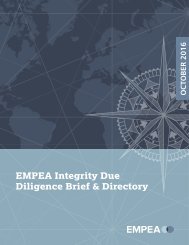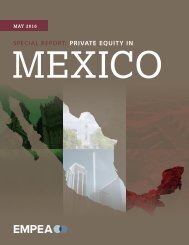Create successful ePaper yourself
Turn your PDF publications into a flip-book with our unique Google optimized e-Paper software.
33<br />
African Development Bank. Mauritius: Country Strategy<br />
Paper 2014-2018: ADB, January 2014, Annex 9, p. 18.<br />
34<br />
See David Clarkson, Stefan Jaecklin, and Kamil<br />
Kaczmarski. Domiciles <strong>of</strong> Alternative Investment Funds:<br />
Oliver Wyman, 2014, p. 10.<br />
35<br />
These factors are described generally in<br />
PricewaterhouseCoopers. Reviewing the Private Equity<br />
Model in the New Financial World: How Specialist Financial<br />
Centres Compare: PwC, February 2013. With respect to<br />
Luxembourg, see Luxembourg Private Equity & Venture<br />
<strong>Capital</strong> Association. Private Equity in Luxembourg 2013<br />
Edition: LPEA, 2013. With respect to Jersey, see Ashley<br />
Le Feuvre. Why Jersey Remains an Attractive Domicile for<br />
Private Equity Funds: Volaw Group, November 2011.<br />
36<br />
PricewaterhouseCoopers. Reviewing the Private Equity<br />
Model in the New Financial World: How Specialist Financial<br />
Centres Compare: PwC, February 2013.<br />
37<br />
The connection between fiscal instability and government<br />
instability is discussed in Luca Agnello and Ricardo M. Sousa.<br />
“Political, Institutional, and Economic Factors Underlying<br />
Deficit Volatility.” Review <strong>of</strong> International Economics 21,<br />
no. 4 (2013): 719-732. See also, Jaejoon Woo. “Growth,<br />
Income Inequality, and Fiscal Volatility: Empirical Evidence.”<br />
In The Political Economy <strong>of</strong> Fiscal Policy: Public Deficits,<br />
Volatility, and Growth, 117-146. Germany: Springer, 2006.<br />
38<br />
Mark J. Roe and Jordan I. Siegel. “Political Instability:<br />
Effects on Financial Development, Roots in the Severity <strong>of</strong><br />
Economic Inequality.” Journal <strong>of</strong> Comparative Economics<br />
39, no. 3 (2011): 279-309.<br />
39<br />
These points are made with respect to India in Ernst &<br />
Young. Private Equity: Breaking Borders: E&Y, 2013, p. 9.<br />
In fact, under the Mauritian GBC1 regime, the company<br />
must have a principal bank account in Mauritius, accounting<br />
records kept in Mauritius, and financial statements audited<br />
in Mauritius. For more details, see http://www.pwc.com/mu/<br />
en/services/tax/gbcone.jhtml.<br />
40<br />
We make this point because surveys have found key<br />
similarities in the domicile decision drivers for these asset<br />
classes, as discussed in David Clarkson, Stefan Jaecklin,<br />
and Kamil Kaczmarski. Domiciles <strong>of</strong> Alternative Investment<br />
Funds: Oliver Wyman, 2014.<br />
41<br />
For a review <strong>of</strong> the academic literature related to the<br />
impacts <strong>of</strong> financial development, see Juzhong Zhuang,<br />
Herath Gunatilake, Yoko Niimi, Muhammad Ehsan Khan,<br />
Yi Jiang, Rana Hasan, Niny Khor, Anneli S. Lagman-<br />
Martin, Pamela Bracey, and Biao Huang. Financial Sector<br />
Development, Economic Growth, and Poverty Reduction: A<br />
Literature Review: Asian Development Bank, October 2009.<br />
42<br />
John Page. Strategies for Pro-Poor Growth: Pro-Poor,<br />
Pro-Growth Or Both?: World Bank, November 2005.<br />
43<br />
Italics added for emphasis. See Organisation for<br />
Economic Co-operation and Development. Promoting Pro-<br />
Poor Growth: Key Policy Messages: OECD, 2006.<br />
44<br />
AVCA Member Pr<strong>of</strong>ile: International Financial Services:<br />
AVCA, 2014. The prominence <strong>of</strong> Mauritius is also articulated<br />
by James Martin <strong>of</strong> Trident Trust in African Private Equity<br />
and Venture <strong>Capital</strong> Association. AVCA: Guide to Private<br />
Equity in Africa: AVCA, 2014, p. 39.<br />
45<br />
For a list <strong>of</strong> DTAAs, see Board <strong>of</strong> Investment Mauritius,<br />
http://www.investmauritius.com/downloads/dtaas.aspx,<br />
accessed December 17, 2014.<br />
46<br />
Trident Trust. Fund Administration Report: Private Equity<br />
Africa Surge Pivots on Mauritius: Trident Trust, June 2010.<br />
47<br />
African tax figures, as well as additional information<br />
on the specifics <strong>of</strong> how specifically to capitalise on these<br />
tax advantages are found in Kieran Loughran and Sonia<br />
Xavier. Private Equity Investment into Africa: The Cayman<br />
and Mauritius Route: Conyers Dill & Pearman, January<br />
2011. We do note that Conyers Dill & Pearman does have<br />
a Mauritius <strong>of</strong>fice and thus may not be the most objective<br />
source. AfrAsia Bank also reports withholding taxes in<br />
Africa jurisdictions <strong>of</strong> interest to international investors from<br />
15% to 20% and capital gains tax between 30% and 40%.<br />
See “African Tax Certainty Vital to Continued Investment.”<br />
Investa, July 15, 2013.<br />
48<br />
For a list <strong>of</strong> IPPAs, see Board <strong>of</strong> Investment – Mauritius,<br />
from http://www.investmauritius.com/downloads/ippa.aspx.<br />
49<br />
With the exception if the expropriation is “for public<br />
purposes, under due process <strong>of</strong> law, on a non-discriminatory<br />
basis and against prompt, adequate and effective<br />
compensation (which shall be made without delay, and be<br />
effectively realisable).”<br />
<strong>Conduits</strong> <strong>of</strong> <strong>Capital</strong> – Onshore Financial Centres and Their Relevance to African Private Equity<br />
| 65





